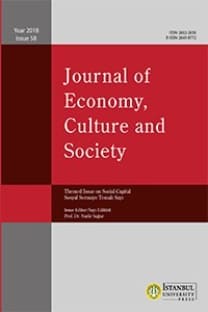İSRAİL EMEK PİYASASINDA FİLİSTİNLİ İSTİHDAMI: İÇ-KOLONYALİZM BELİRTİLERİ
Bu makalede, 1967 Altı Gün Savaşı’nın ardından, İsrail tarafından işgal edilmeye başlanan Batı Şeria ve Gazze’deki değişen mülkiyet ve üretim yapısı ile birlikte Filistin vatandaşlarının İsrail emek piyasasındaki istihdam koşulları tartışılmaktadır. Bu bağlamda, İsrail Devleti’nin söz konusu değişmelere yol açan faaliyetlerinin altında yatan ekonomik kaygılar, mevcut sınırlı tartışmalarda vurgulanan emperyalizm yahut alt-emperyalizm gibi kavramlardan ziyade, iç-kolonyalizm kavramıyla açıklanacaktır. Bunun iki temel sebebi, İsrail ile işgal edilen topraklardaki ilişkinin etnik karakter taşıması ve aynı zamanda ileri seviyede kapitalist bir toplumsal yapının oluşmadığı İsrail Devleti’nin tam anlamıyla emperyalist olarak tanımlanamayacak olmasıdır
Anahtar Kelimeler:
-
THE PALESTINIAN LABOUR IN ISRAEL: INDICATIONS OF INTERNAL COLONIALISM
The property and production structure in the occupied territories of the West Bank and Gaza, and employment of Palestinians in the Israeli labour market is changing. The concept of internal colonialism offers a better understanding about the economic concerns of Israel on the occupied territories than imperialism or sub-imperialism. This is because the relationship between Israel and the occupied territories has an ethnic characteristic, and additionally, Israel cannot be easily explained as economically imperialist because of the non-existence of advanced capitalist conditions in Israeli society.Keywords: Israel, West Bank and Gazza, Internal colonialism, Imperialism
Keywords:
Israel, West Bank and Gazza, Internal colonialism Imperialism,
___
- Aharoni, Y. (1998), ‘The Changing Political Economy of Israel’, Annals of the American
- Academy of Political and Social Science, Vol. 555, pp. 127-146. Ayyash, A. A. (1981), ‘Israel Planning Policy in the Occupied Territories’, Journal of
- Palestine Studies, 11(1), pp. 111-123. Benvenisti, M. (1986), ‘Demographic, Economic, Legal, Social and Political
- Developments in the West Bank’, West Bank Data Base Project/ Jerusalem Post. Blauner, R. (1969), ‘Internal Colonialism and Ghetto Revolt’, Social Problems, 16(4), pp. 93-408.
- Chomsky, N. (2003), ‘Middle East Illusions Including Peace in the Middle East?
- Reflections on Justice and Nationhood’. Oxford: Rowman & Littlefield Publishers. Hechter, M. (1975), Internal Colonialism: The Celtic Fringe in British National
- Development 1536-1966. London: Routledge and Kegan Paul.
- Farsakh, L. (2005), Palestinian Labour Migration to Israel: Labour, Land and Occupation, London and New York: Routledge.
- Frank, A. G. (1979), ‘Unequal Accumulation: Intermediate, Semi- Peripheral, and Sub
- Imperialist Economies’, Review (Fernand Braudel Center), 2(3), pp. 281-350. Gazit, H. Y. (2007), Land Expropriation in Israel: Law, Culture and Society.
- Hampshire: Ashgate Publishing Limited. Gilmour, D. (1980), Dispossessed: The Ordeal of the Palestinians 1917- 1980. London:
- Sidgwick and Jackson. Gordon, N. (2008), Israel’s Occupation. London: University of California Press.
- Khouri, R. G. (1980), ‘Israel’s Imperial Economics’, Journal of Palestine Studies, 9(2), pp. 71-78.
- Legassick, M. and Wolpe, H. (1976), ‘The Bantustans and capital accumulation in South
- Africa’, Review of African Political Economy, 3(7), pp. 87-107. Lenin, V. I. (1969), Collected Works Volume 3: The Development of Capitalism in
- Russia. Moscow: Progress Publishers. Loomba, A. (2000), Colonialism/Postcolonialism. New York & London: Routledge.
- Machover, M. and Orr, A. (2002), ‘Reprint: The Class Character of Israel’, International
- Socialist Review Issue. No:23, Available from: http://www.isreview.org/issues/23/class_ character_israel.shtml [Accesed: 05.05.2014].
- Mark, C. R. (2005), ‘Israel: U.S. Foreign Assistance’, CRS Issue Brief for Congress.
- Published by Congressional Research Service. Marx, K. (1867), Capital: A critique of Political Economy Volume One.
- (Translated by Ben Fowkes), Middlesex: Penguin Books Ltd, 1982.
- Oron, A. (2013), What’s behind Israel’s biggest economic boom? The occupation,
- Haokets, Available from: http://972mag.com/whats-behind- israels-biggest-economic- boom-the- occupation/81038/ [Accesed: 07.05.2014].
- Portugali, J. (1989), ‘Theory and Practice in the Israeli-Palestinian Case’, Transactions of the Institute of British Geographers, New Series, 14(2), pp. 207-220.
- Ryan, S. (1974), ‘Israeli Economic Policy in the Occupied Areas: Foundations of a New
- Imperialism’, Middle East Research and Information Project (MERIP) Reports. No. 24, pp. 3-28. Rosenhek, Z. (2003), The Political Dynamics of a Segmented Labour Market: Palestinian
- Citizens, Palestinians from the Occupied Territories and Migrant Workers in Israel, Acta Sociologica, 46(3), pp. 231-249
- Sa’di, A. H. (1995), ‘Market Incorporation without Integration: Palestinian Citizens in
- Israel’s Labour’, Sociology, 29(3), pp. 429-451. Swirski, S. (2005), ‘The Price of Occupation The Cost of the Occupation to Israeli
- Society’, Palestine-Israel Journal of Politics, Economics and Culture, 12(1), Available from: http://www.pij.org/details.php?id=335 [Accesed: 07.05.2014].
- Wolpe, H. (1976), ‘The ‘White Working class’ in South Africa’, Economy and Society, 5(2), pp. 197-240.
- Zureik, E. T. (1979), The Palestinians in Israel: A study of Internal Colonialism,
- London: Routledge and Kegan Paul. Zureik, E. T. (1983), ‘The economics of dispossession: The Palestinians’,
- Third World Quarterly, 5(4), pp.775-790.
- ISSN: 2602-2656
- Yayın Aralığı: Yılda 2 Sayı
- Başlangıç: 1960
- Yayıncı: İstanbul Üniversitesi Yayınevi
Sayıdaki Diğer Makaleler
KİMLİK OLUŞUMU SÜRECİNDE POPÜLER MÜZİĞİN ETKİSİ
İSRAİL EMEK PİYASASINDA FİLİSTİNLİ İSTİHDAMI: İÇ-KOLONYALİZM BELİRTİLERİ
TÜRKİYE’DEKİ İŞ KAZALARI VE İŞÇİ ÖLÜMLERİNİN EKONOMİK BOYUTU VE POLİTİKA ÖNERİSİ
KÜRESELLEŞMENİN AFRİKA ÜZERİNDEKİ EKONOMİK VE POLİTİK ETKİLERİ
ETNİSİTE, DİL, EĞİTİM: ETNİK HANEHALKLARINDA DEVLET DİLİ VE ANADİLİN YÜZLEŞİMİ
